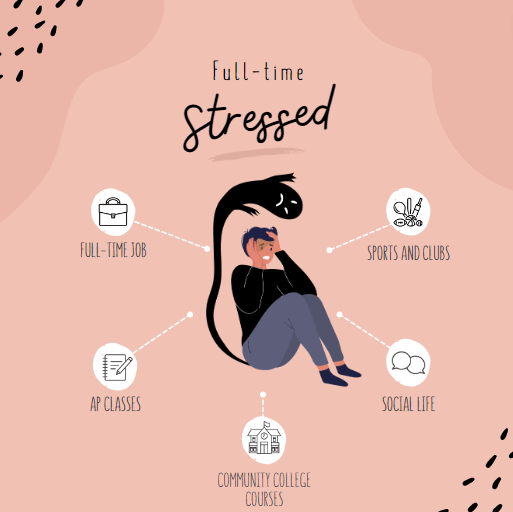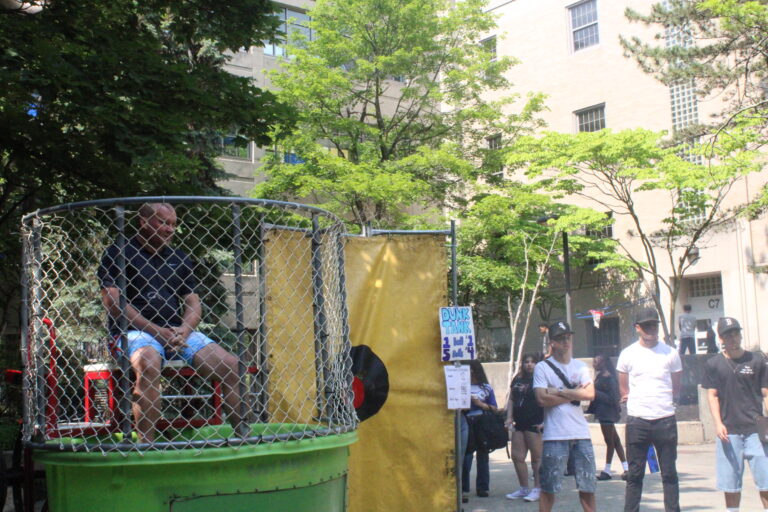
Commitment.
Webster’s Dictionary defines it as an agreement or pledge to do something in the future; the Oxford Dictionary defines it as an engagement or obligation that restricts freedom of action; I define it as a source of stress.
At the end of every year, students meet with their guidance counselors to discuss their classes for the next academic year. A common strategy, and the one I went for, was to actively choose the hardest classes that were still manageable. For me, that included two AP classes. If I had room in my schedule, I was considering a third. Every other class was Honors track.
Around that same time, I applied for a job. It was supposed to be a casual job, a few shifts a week, perhaps. To my delight, I was accepted almost immediately. I finished the last month or so of my freshman year, coasting off my new job and the ease of classes ending.
Over the summer, due to my lack of school, I was able to work a lot more shifts. I got sucked into my job, like a moth to a light. I got close with a lot of my coworkers, and work became nearly the only thing I did. And I loved it.
But like with all jobs, there were moments that I hated, moments I wanted to quit, and moments I felt in over my head. With a lot of my job focusing on customer service, I was burning out fast from dealing with ill-tempered customers and hot-headed clientele. Despite my deteriorating energy, I kept the job, holding on to that novelty from the months prior.

As the school year started up again, I cut my hours down at work. I still consistently worked more hours than most students, but work was usually my favorite part of the day – of course I worked a lot of hours.
As the class load got heavier, though, it got harder and harder to keep up with my seemingly infinite shifts. I was pulling all-nighters to keep up with my homework, or coming home from work so exhausted I was asleep on the couch before I even thought about what I was doing.
As someone who has always prioritized schoolwork and grades, I was not ready to let my grades suffer. It has been ingrained in me to put school above all else. So, I spent every waking minute working on something. Whether I was at work, in class, or doing homework, there was always something that needed to be done.
By November, I did not recognize myself anymore. My constant cycle of needing to get everything done completely wiped out my energy. I was snapping at people, running near-exclusively on caffeine, and barely taking care of myself. I lost a good number of friends during this time due to my combination of lack of free time and energy.

At the end of the month, I hit my breaking point. I was getting home from shifts so exhausted that I was consistently behind on homework, but still was not catching up on sleep, either. All I wanted was a break from everything, to have no homework, no school, no shifts, nothing. I was bordering on disassociating my way through. I managed to get through most of December, with my grades and mental health at an all-time low. It was not possible to commit myself to everything anymore.
I took a week off of work towards the end of December. Strangely enough, by the end of the week, I missed it. While I had always loved my job, I did not think I would miss my job to the extent I did after a measly seven days.
And so, I dove head first back into work. I started working the same hours I had before, fully committing myself back to my role.
A week off surely should have been enough to dive back into it, right?
Sure enough, I was already burning out again by New Year. Midterms were approaching fast and I was still pushing through work from the previous week. As my grades ticked down, all I could do was watch.
Finally, I found the courage to limit my commitments. As briefly as possible, I told my manager I needed to cut my hours at work; I could not be there as often as I was. I chose not to re-enroll for extra classes at Bunker Hill.
Best of all, I started asking for help from the people around me: from asking teachers for extra help to collaborating on work with classmates; from asking coworkers to take on some of my shifts to having coworkers drive me home after a long night; from asking for days off to sleeping in on Saturdays.
Slowly but surely, I started to find pieces of myself I forgot existed. With my newfound time off, I increased my time reading, rock climbing, playing guitar, and simply doing all the things I loved to do again. My relationships with the people around me improved. Small things like going to the mall with friends and going to bed before three in the morning were possible again.
As I started appreciating the things around me again, I also had this building sense of guilt. Why should I be taking these extra days off that I could be using to be at work, doing homework, or anything else productive?
Since then, I have been flipping between having multiple consecutive days off, and working until I physically cannot anymore. Even with the number of shifts I work, every day I take off comes with that sense of guilt that I should be doing more. I know my brain is wrong about that, that I do not need to be constantly productive, but it is not always easy to tell myself that.
There’s not really a happy ending to this story. I have not convinced myself fully that it is okay to take time for myself or to ask for help. The one thing I can say, though, is to not be afraid to cut out overbearing commitments and to put yourself first. It might be hard, but sometimes the best thing you can do is to take a break.



